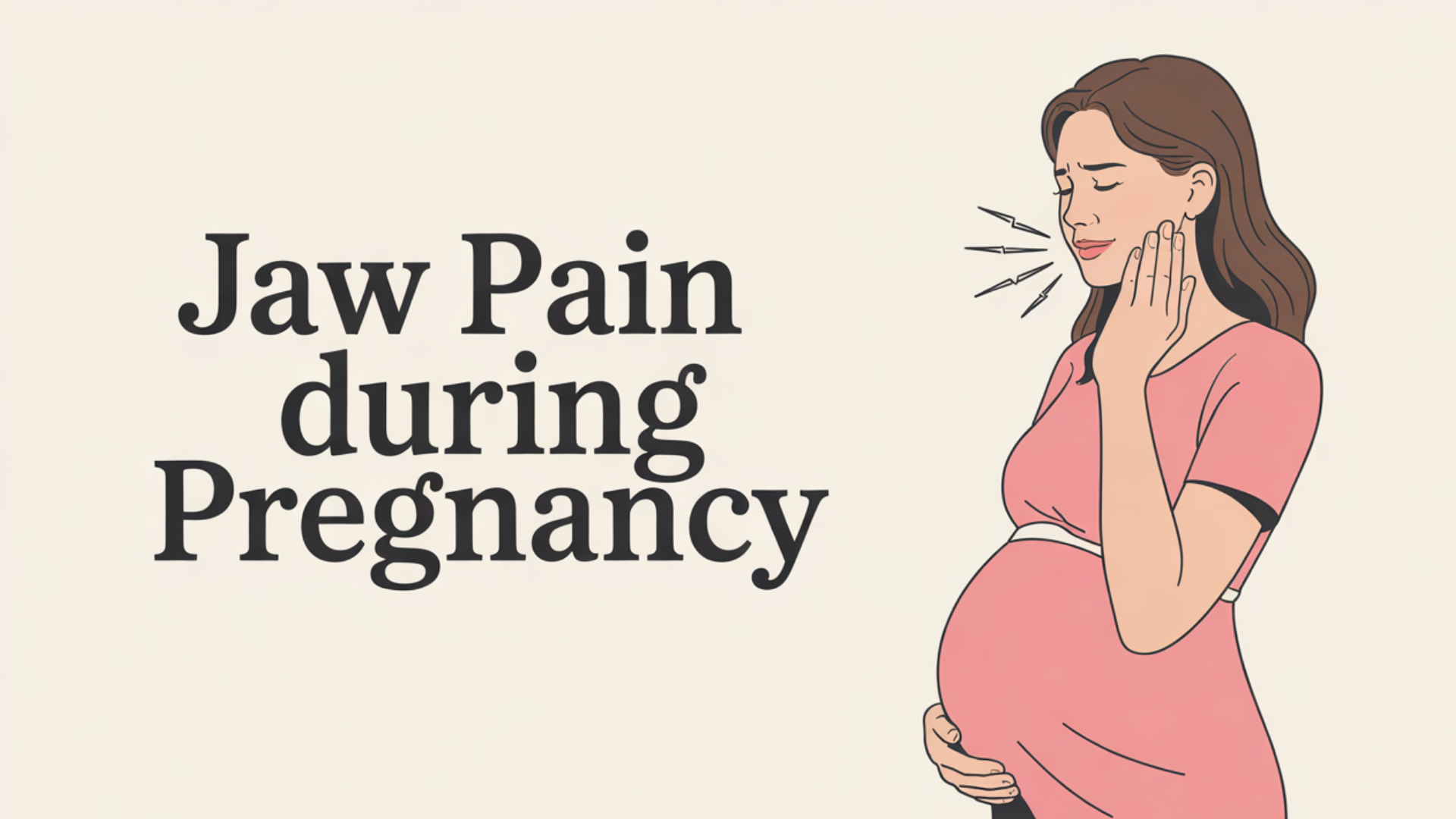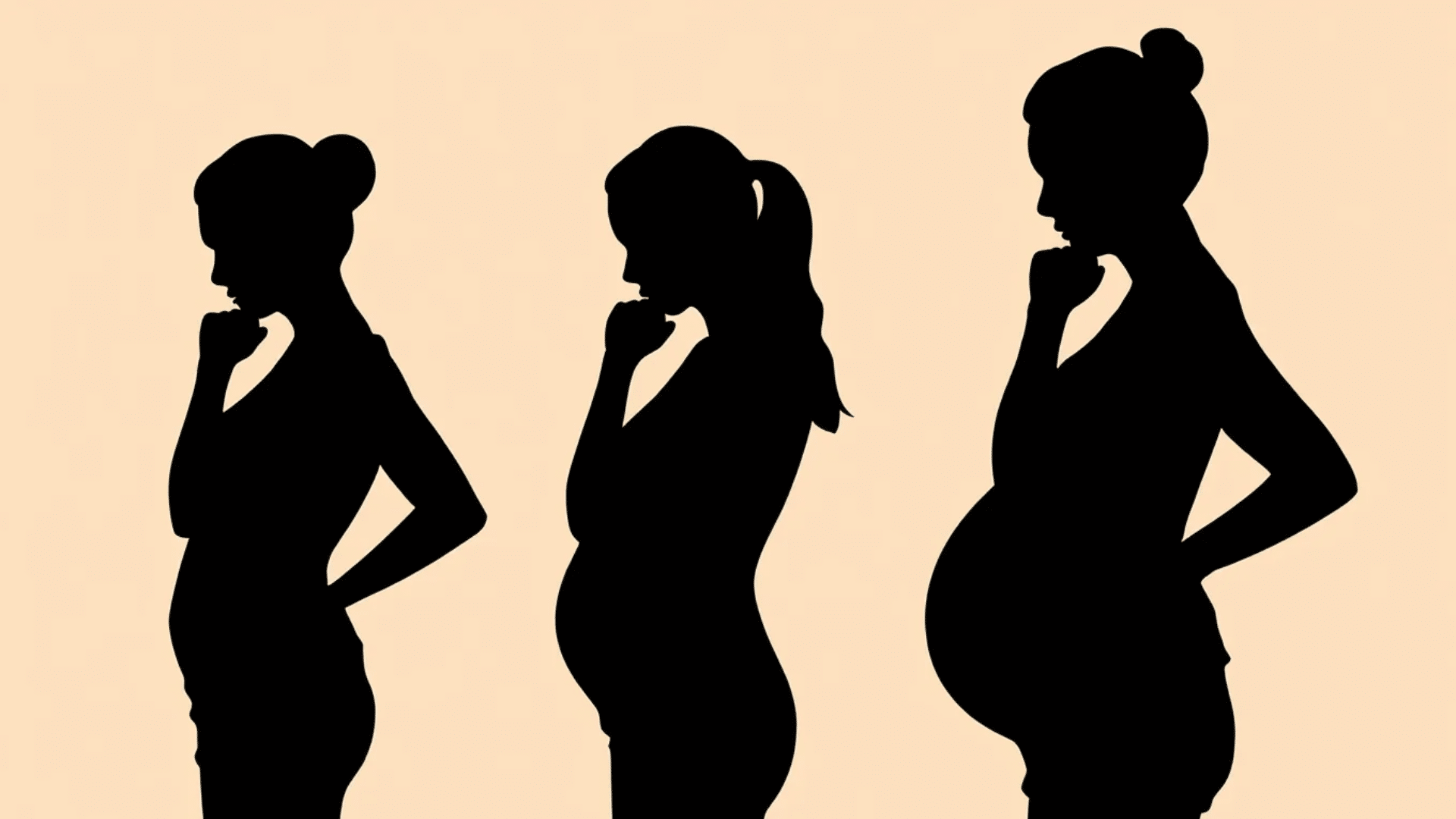
Are you feeling strange aches in your jaw while expecting a baby? You’re not alone! Jaw pain during pregnancy is more common than most moms-to-be realize.
This unexpected discomfort can manifest as soreness when you chew, stiffness upon waking, or even clicking sounds when you open your mouth.
Your changing hormones are often the culprit, loosening joints throughout your body, including your jaw.
Stress about your upcoming little one might also cause nighttime teeth grinding without you even knowing it.
While usually not dangerous, jaw pain during pregnancy can make eating and talking uncomfortable.
The good news? Most jaw pain goes away after your baby arrives, and there are simple ways to find relief while you wait for your bundle of joy.
What Does Jaw Pain Feel Like?
During pregnancy, jaw pain can be an unexpected and uncomfortable symptom that many women experience.
You may notice persistent soreness or aching in your jaw, which can make everyday activities like eating or talking uncomfortable.
Your jaw might feel stiff or tight, especially when you wake up in the morning. Some pregnant women also experience clicking or popping sounds when opening their mouths or chewing.
This discomfort can affect one or both sides of your face. Jaw pain during pregnancy is often linked to hormonal changes that relax your ligaments, or to stress that causes teeth grinding at night.
While these symptoms are usually not serious, mentioning them to your healthcare provider can help you find relief during this special time.
Why Does Jaw Pain Happen in Pregnancy?

Pregnancy brings many physical changes that can trigger jaw pain. Hormones, stress, and physical adjustments all play important roles. Understanding these causes can help you find appropriate relief.
1. Hormone changes
During pregnancy, your body releases relaxin and other hormones that loosen ligaments and joints throughout your body, including your jaw.
This loosening can cause the temporomandibular joint (TMJ) to become unstable, leading to pain, clicking, or difficulty opening your mouth fully. These hormonal effects typically resolve after delivery.
2. Stress and teeth grinding.
Pregnancy can bring worries about your baby, finances, and life changes. This stress often manifests as nighttime teeth grinding or jaw clenching (bruxism).
You might wake with a sore jaw without realizing you’ve been grinding your teeth all night. A dental night guard can help protect your teeth and reduce jaw strain.
3. Swelling or water retention
The increased blood volume and fluid retention common in pregnancy can affect your entire body, including your face and jaw area.
This swelling puts extra pressure on nerves and tissues around the jaw joint. Reducing salt intake and staying hydrated can sometimes help minimize this type of discomfort.
4. Posture changes
As your baby grows, your center of gravity shifts forward, often leading to compensatory posture changes.
Many pregnant women develop forward head posture or rounded shoulders, creating tension that travels up the neck to the jaw muscles. Gentle stretching and posture awareness can help reduce this source of pain.
5. Sinus pressure
Pregnancy hormones can cause the nasal passages and sinuses to swell, leading to congestion and sinus pressure.
This pressure can radiate to the jaw area, mimicking TMJ pain. Pregnancy-safe decongestants recommended by your doctor and steam inhalation may provide relief from this type of discomfort.
6. TMJ disorders
Women with pre-existing temporomandibular joint disorders may experience worsening symptoms during pregnancy.
The combination of hormonal changes, stress, and physical adaptations can aggravate underlying jaw issues. Gentle jaw exercises and warm compresses often help manage these flare-ups until hormone levels normalize after birth.
7. Nutritional factors
Pregnancy increases your need for minerals like calcium and magnesium, which play crucial roles in muscle function and nerve signaling.
Insufficient levels can contribute to muscle cramps and tension, including in the jaw. Eating a balanced diet rich in these minerals may help reduce muscle-related jaw discomfort.
8. Sleep position changes
Many pregnant women switch to side sleeping as their belly grows, which can put direct pressure on the jaw when sleeping.
Using a supportive pillow between your shoulder and head can help maintain proper alignment. Pregnancy pillows designed for side sleeping can also help reduce strain on your neck and jaw.
Recognizing Serious Jaw Pain During Pregnancy

While some jaw discomfort is normal during pregnancy, certain symptoms suggest you should contact your healthcare provider promptly. Never ignore severe or worsening pain, as it could indicate a more serious issue requiring medical attention.
Red Flags to Watch For
Most jaw pain during pregnancy is harmless, but watch for these warning signs that indicate you should seek medical advice:
- Pain that continues to intensify or becomes severe
- Noticeable swelling or redness around your jaw area, especially when accompanied by fever
- Inability to fully open your mouth or difficulty moving your jaw from side to side
- Symptoms of dental problems, like sharp tooth pain, sensitivity, or bleeding gums
- Pain that disrupts your sleep or makes eating difficult
If you experience any of these symptoms, it’s important to contact your healthcare provider or dentist. Early intervention can prevent complications and provide relief during your pregnancy.
Possible Link to Preeclampsia
Jaw pain combined with facial swelling can occasionally be a sign of preeclampsia, a serious pregnancy complication characterized by high blood pressure.
The swelling occurs because preeclampsia causes your body to retain fluid and can affect your face, hands, and feet.
This type of swelling typically develops gradually and may be accompanied by headaches, vision changes, or upper abdominal pain.
When related to preeclampsia, jaw pain often feels different from typical TMJ discomfort—it may feel more like pressure or generalized facial pain.
If you notice sudden swelling in your face along with jaw pain, especially after the 20th week of pregnancy, contact your healthcare provider immediately, as preeclampsia requires prompt medical treatment.
Trimester-specific concerns

Pregnancy affects your body differently as weeks progress, including how jaw pain manifests and what causes it.
Understanding these changes can help you distinguish between normal discomfort and warning signs that require attention.
| TRIMESTER | CONCERNS |
|---|---|
| First Trimester | Jaw sensitivity, soreness from morning sickness, teeth grinding, gum tenderness, and posture changes. |
| Second Trimester | Jaw loosening, posture, and jaw tension from weight gain, swelling, sinus congestion, and sleep pressure. |
| Third Trimester | Fluid retention and swelling, sleep discomfort, teeth grinding, postural strain, and preeclampsia risk. |
Most jaw discomfort during pregnancy resolves after delivery as hormone levels normalize and physical stresses ease.
If your pain becomes severe or is accompanied by other concerning symptoms, always consult your healthcare provider for personalized advice.
How to Relieve Jaw Pain During Pregnancy?

Finding safe ways to manage jaw pain is important when you’re expecting. Many simple home remedies can provide relief without medication. For persistent pain, professional help is available.
Simple Solutions You Can Try at Home
Try these simple solutions to ease jaw discomfort during pregnancy without using medications:
- Place a warm washcloth on your jaw for 10-15 minutes to relax tight muscles and improve blood flow
- Gently massage your jaw muscles in circular motions using your fingertips
- Stick to soft foods like yogurt, mashed potatoes, and smoothies that don’t require much chewing
- Practice good posture and use a supportive pillow that keeps your neck and jaw aligned during sleep
- Take breaks throughout the day to relax your jaw by slightly opening your mouth and breathing deeply
Remember to be patient and consistent with these remedies. If pain persists after trying these methods for several days, it might be time to talk with your healthcare provider.
Working with a Physical Therapist
A physical therapist who specializes in jaw problems can teach you specific exercises tailored to pregnancy.
These experts understand how to safely work with expectant mothers to relieve TMJ pain without harmful medications.
They may demonstrate gentle jaw stretches, proper alignment techniques, and specialized massage methods that target specific tension points.
Many therapists also provide ultrasound therapy or heat treatments that are pregnancy-safe.
Your doctor can refer you to a physical therapist experienced in treating pregnant women, and most insurance plans cover these sessions with a referral.
Can a Dentist Help?
Dentists offer specialized solutions for pregnancy-related jaw pain that your regular doctor might not provide.
They can diagnose if your discomfort is caused by teeth grinding, dental issues, or TMJ problems and recommend appropriate treatments.
Most dental procedures can be performed safely during pregnancy with proper precautions to protect both you and your baby.
When to see a dentist
If you’re experiencing jaw pain during pregnancy, a dentist may offer solutions your regular doctor might not consider.
Pain from teeth grinding or jaw clenching (bruxism) is a common issue that dentists frequently encounter.
They can also identify if your discomfort stems from tooth infections, gum disease, or wisdom teeth problems that might worsen during pregnancy.
Many dentists recommend a custom-fitted night guard to prevent grinding and reduce jaw strain. While some women worry about dental visits during pregnancy, most dental care is considered safe after the first trimester.
Your dentist can coordinate with your obstetrician if you need treatment during early pregnancy.
Pregnancy-safe dental procedures
Maintaining dental health remains important throughout pregnancy. Fortunately, most essential dental care can be performed safely with proper precautions.
- Most routine dental procedures are considered safe during pregnancy, especially in the second trimester.
- Cleanings, cavity fillings, and crown repairs can be performed with pregnancy-safe local anesthetics.
- Dentists typically avoid X-rays unless necessary, using double shielding if required.
- Emergency procedures, such as root canals, can be performed safely when an infection threatens maternal health.
- Cosmetic procedures are usually postponed until after delivery
Always communicate openly with your dental provider about your pregnancy status. Your dentist and obstetrician can collaborate to ensure you receive the necessary treatment while protecting your baby’s development.
Tips to Prevent Jaw Pain
Prevention is often easier than treating jaw pain once it develops. These simple daily habits can help protect your jaw health during pregnancy and potentially avoid discomfort altogether.
- Avoid difficult foods – Skip chewing gum, tough meats, hard candies, and crunchy foods that require extra jaw effort during pregnancy.
- Practice relaxation techniques – Keep your teeth slightly apart with your jaw muscles relaxed throughout the day to prevent tension from building up.
- Maintain proper hydration – Drink plenty of water daily to reduce inflammation and help your muscles function properly.
- Prioritize quality sleep – Use supportive pillows and find comfortable positions that don’t put pressure on your jaw.
- Consider protective devices – discuss a custom night guard with your dentist if you grind your teeth during sleep.
Remember that small changes in your daily routine can make a big difference in preventing jaw discomfort.
If you do develop pain despite these precautions, don’t hesitate to discuss it with your healthcare provider for additional solutions.
Final Words
Dealing with jaw pain during pregnancy doesn’t have to add extra stress to your trip. Remember that warm washcloths, gentle massage, and soft foods can help alleviate discomfort without the need for medication.
Pay attention to how you sleep and sit, as maintaining good posture helps alleviate pressure on your jaw.
If the pain worsens or is accompanied by swelling and fever, don’t wait to consult your doctor or dentist.
While jaw pain is typically just another temporary pregnancy symptom, it deserves attention if it’s making eating or talking difficult.
Most women find that their jaw pain subsides after delivery, when their hormones return to normal levels.
Until then, be gentle with yourself and remember that each discomfort brings you one step closer to meeting your little one. Your smile will feel normal again before you know it!
If you’re interested in more informational mothers and babies blogs, feel free to click here and explore other blogs you might enjoy.

